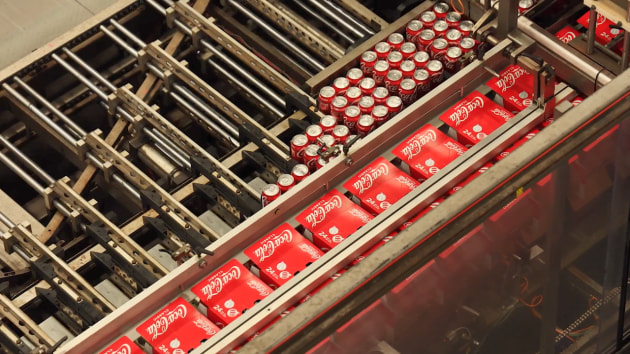A $22.2 million can line upgrade at Coca-Cola Europacific Partners (CCEP) Australia's Richlands facility is officially complete, and construction is now underway on an additional can line, backed by a further multi-year $75 million investment.
Together, the infrastructure will increase production capabilities of canned beverages in the Sunshine State, helping to meet growing consumer demand while delivering a raft of sustainability benefits, the company says.

The upgraded can line, supplied and installed by KHS, is the company’s most efficient can line to date and has the capacity to fill up to 2000 cans per minute, in a variety of formats, for popular brands such as Coca-Cola Zero Sugar, Sprite, and Mount Franklin Lightly Sparkling.
Catering for increasing consumer demand for canned beverages, the new line allows CCEP to scale its local can production and to deliver beverages "more quickly and sustainably".
CCEP has also revealed an additional multi-year $75 million investment into a new can line at the same facility, which will supercharge the local production of Monster Energy Company products. Anticipated for completion in mid-2025, this new can line will use world-class equipment and the latest technology to increase CCEP’s energy drink production capabilities, in step with rapid category growth.
Orlando Rodriguez, managing director at CCEP Australia, said: “At CCEP, we have a comprehensive sales and distribution network that covers every Australian postcode. This includes a strong and growing footprint in Queensland, where our local manufacturing capabilities have never been more critical.

“It’s important to us that we’re continually improving our operations to drive efficiencies, both in terms of sustainability and costs. These latest, state-of-the-art investments in manufacturing technology at Richlands represent a leap forward in productivity, safety, quality, and environmental stewardship, which are key pillars of our business and essential to our future.”
The site’s upgraded can line is projected to conserve more than three Olympic-sized swimming pools of water annually compared to other existing can lines.
Energy savings will also be unlocked thanks to its ability to fill cans at room temperature, eliminating the need for energy-intensive cooling processes; a feature that is expected to reduce energy consumption by approximately 23 per cent compared to the previous line.

Safety is also front-and-centre, with the team having undertaken a rigorous design validation process, using virtual reality to refine equipment layout and proactively identify and address potential risks.
The can lines at Richlands form part of a broader wave of investments by CCEP in its Australian operations. Earlier this year, the company announced a substantial $105.5 million investment in a new Warmfill Line to produce Powerade and Fuze Tea products at its Moorabbin plant in Victoria, while in 2022 the company completed a $43.7 million upgrade of an existing can line at the same site.

Rodriguez emphasised: “At a time where local manufacturing is so critical, CCEP is proud to announce another significant investment in the industry. This enhancement to our Richlands facility is a key part of our broader strategy, following our landmark investment in Victoria – our largest ever in Australia.
“In the short term, investing in our local manufacturing infrastructure significantly enhances our ability to meet the needs of our valued customers. In the years to come, these efforts to build our operational presence nearer to the end-consumer will help make our ambition to reach net zero emissions a reality.
“The initiatives come at a cost, but ensuring our operations are as sustainable as possible is a responsibility we’re firmly committed to. It’s part of the value-chain approach we take to doing business and is something we take very seriously.”
CCEP has been manufacturing beverages in Australia for more than 85 years and has operations in every state and territory across the country. The Richlands site is one of 20 CCEP-managed sites in Queensland, with the company’s property footprint spanning as far north as Cairns.






